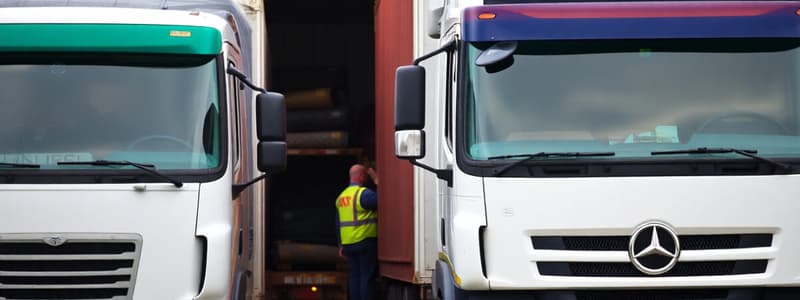Podcast
Questions and Answers
Match the following roles with their responsibilities during load inspection:
Match the following roles with their responsibilities during load inspection:
Contractor = Inspects and adjusts load for transport Production company crew member = Checks load if vehicle is owned/rented Transport vehicle owner = Ensures load safety before transport Load inspector = Verifies the security of the load
Match the following types of movement that can damage a load with their descriptions:
Match the following types of movement that can damage a load with their descriptions:
Side to side movement = Can cause shifting and potential damage during transit Up and down movement = Results from hitting bumps, potholes, or dips Inward movement = Caused by insufficient securing of the load Outward movement = Results from overloading the vehicle
Match the following load securing methods with their purposes:
Match the following load securing methods with their purposes:
Tiedown ropes = Secure the load tight against truck walls Straps = Prevent movement of the load during transport Moving blankets = Provide cushion between items to prevent damage Scrap carpet pieces = Act as a protective layer for fragile items
Match the following types of items with their proper placement during loading:
Match the following types of items with their proper placement during loading:
Match the following consequences with their causes when transporting loads:
Match the following consequences with their causes when transporting loads:
Flashcards are hidden until you start studying
Study Notes
Load Inspection and Responsibility
- After a bump-out, inspecting the load on a transport vehicle is essential before departure.
- Contractors are responsible for checking and adjusting the load if using their own vehicle.
- Crew members must ensure proper load checks and adjustments when the vehicle is owned or rented by the production company.
Load Arrangement and Safety
- Lightweight items should be placed on top of heavier items to prevent crushing during transport.
- Movement of the load during transport, including side-to-side and vertical shifts, can lead to damage.
Prevention of Load Damage
- Restraints like tiedown ropes or straps are critical to secure the load against truck walls, minimizing movement.
- Using spare moving blankets, scrap carpet pieces, or underlay can provide cushioning between different loaded items.
- The primary objective is to secure the load tightly to avoid movement while ensuring no damage to the items occurs.
Studying That Suits You
Use AI to generate personalized quizzes and flashcards to suit your learning preferences.



